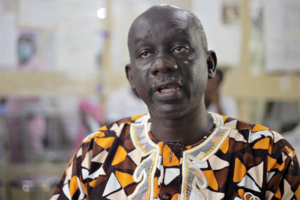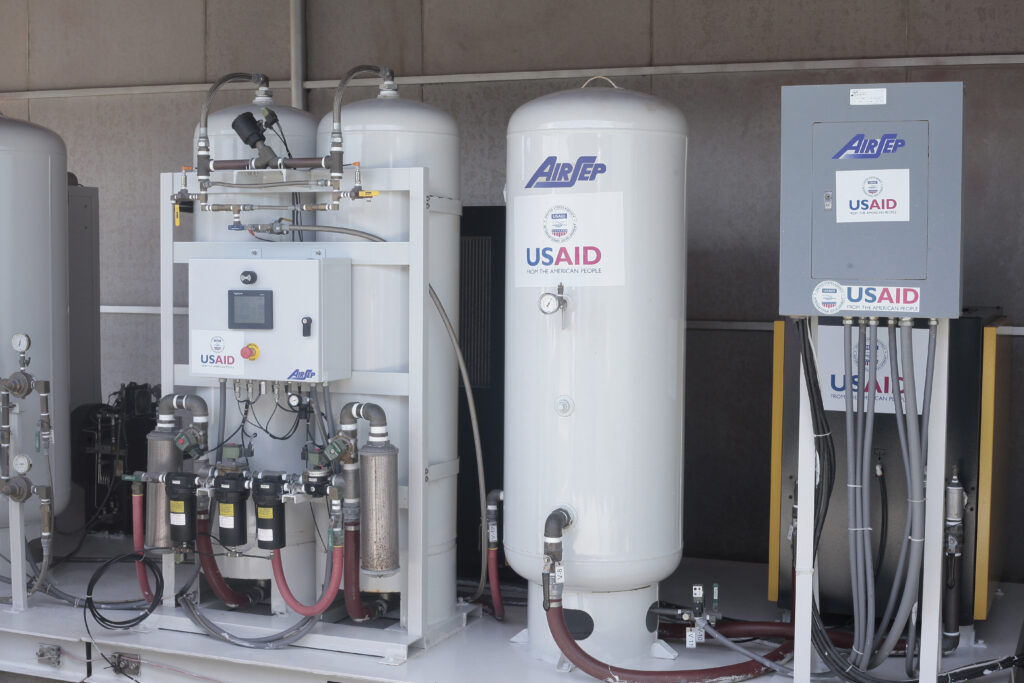Cape Coast, Ghana –– Medical oxygen has never been easy to come by in Ghana. In early 2020, the country was experiencing a shortage of oxygen supplies. Oxygen canisters were hard to find and expensive when they could be found at all. And then COVID-19 arrived, expanding the number of people who were experiencing respiratory distress and in need of oxygen.

The U.S. Agency for International Development (USAID), through the Reaching Impact, Saturation and Epidemic Control (RISE) project, partnered with the Ghana Health Service to address the COVID-19 pandemic by providing health workers with the skills and training to provide oxygen therapy. RISE also worked with the Ghana Health Service to install pressure swing adsorption (PSA) plants that convert ambient air (air in the atmosphere, 21% oxygen) into medical oxygen (around 90% oxygen).
Dr. Derek A. Bonsu, Medical Director for Cape Coast Metropolitan Hospital (CCMH) and a physician with Ghana Health Service for 28 years, has worked in an oxygen-constrained setting for most of his career. Many times, he found himself rationing oxygen supplies when faced with multiple patients in need. When only a limited number of canisters were available, he and other health workers were unable to meet the needs of patients who required higher concentrations of oxygen. This situation was so common that doctors gave it a name, “no oxygen syndrome.”
With the installation of a PSA plant at his hospital, “no oxygen syndrome is no more,” said Dr. Bonsu.
The standard of care offered at Cape Coast emergency ward is so improved, we no longer have to choose who gets oxygen.”
Dr. Bonsu.
RISE’s COVID-19 intervention in Ghana began with a country-wide oxygen needs assessment in partnership with the Ghana Health Service. Following a review of hospitals and health care facilities in the 16 regions, RISE chose four sites to receive PSA plants. In addition, RISE provided oxygen delivery devices (such as masks, valves and related equipment) to 30 health centers and hospitals across the country. RISE also held a workshop in partnership with experts from Korle-Bu Teaching Hospital in Accra and Johns Hopkins University to train health workers on the correct use of oxygen for patients; 31 health workers participated.
“PSA plants have done so much to address the shortage in the country,” said Dr. Paa Kobina Forson, RISE Ghana Technical Director. “For instance, the PSA plant at Cape Coast Hospital is now supplying the national ambulance service with oxygen cylinders.”

CCMH was selected because of its location in the populous Central Region, the long distance—142-kilometers—it takes to bring oxygen cylinders from Accra and the availability of existing infrastructure that could be readily updated with oxygen piping.
With support from USAID’s RISE, the nearly century-old CCMH was able to renovate a dilapidated building on the hospital grounds and return it to service as a COVID-19 ward, ready to treat and isolate patients with the most severe infections. The hospital installed new piping from the PSA plant directly to the beds in the treatment wards. Additional updates included plumbing, painting and carpentry to make ward rooms more functional and in line with modern medical standards. The CCMH COVID-19 ward successfully treated many patients in the region, Dr. Bonsu said.
While COVID-19 was a shock to the national health system, Dr. Bonsu feels passionately that, “No one should lose sight of the other conditions that patients face. They are equally important.” The hospital routinely sees patients with conditions such as flu, pneumonia and tuberculosis. All of these patients also need oxygen.
“The PSA plant is a godsend for patients and providers,” he said. “The hospital has an unlimited supply of oxygen now running directly to beds. It is like living in a house with no water, and now we have running water installed. I’m very thankful for the PSA plant.”
As the COVID-19 pandemic has evolved in Ghana and infections have fallen off, Dr. Bonsu and CCMH have been able to repurpose half of the COVID-19 ward as a new emergency room for the surrounding community. Now, the PSA plant serves all local patients in critical respiratory distress. Patients who arrive at the emergency ward with strokes, pregnancy complications or newborns in distress can all be treated immediately and without rationing of oxygen resources.
Recently, the hospital treated one of their own—a worker from the regional health office. Found unresponsive, the colleague arrived at the CCMH emergency ward in respiratory distress with signs of a heart attack and renal failure. Staff stabilized the man by providing supplementary oxygen. The ability to access emergency care at CCMH, as opposed to traveling to a more distant central hospital, saved this patient’s life. Without the investment of the PSA plant, their colleague would likely have died shortly after his arrival at CCMH, Dr. Bonsu said.
The Cape Coast PSA plant is sending oxygen to many parts of the Central Region and beyond. The PSA plant moved oxygen from being a costly resource, where the hospital was forced to buy canisters in Accra and pay to have them transported down the coast, to being essentially free for the hospital.
In addition, the Cape Coast PSA plant is operating as an independent business entity. The proceeds from several oxygen supply contracts will be used for plant maintenance, which will allow the plant to operate in perpetuity. While identified as a quick solution to meet the needs of the COVID-19 pandemic, this PSA plant is a long-term investment in emergency care for all Ghanaians.
Olivia Harrison is a Senior Communications Specialist for the Reaching Impact, Saturation, and Epidemic Control (RISE) project, the Jhpiego-led consortium that provides HIV and COVID prevention and treatment services with funding from the U.S. Agency for International Development.



